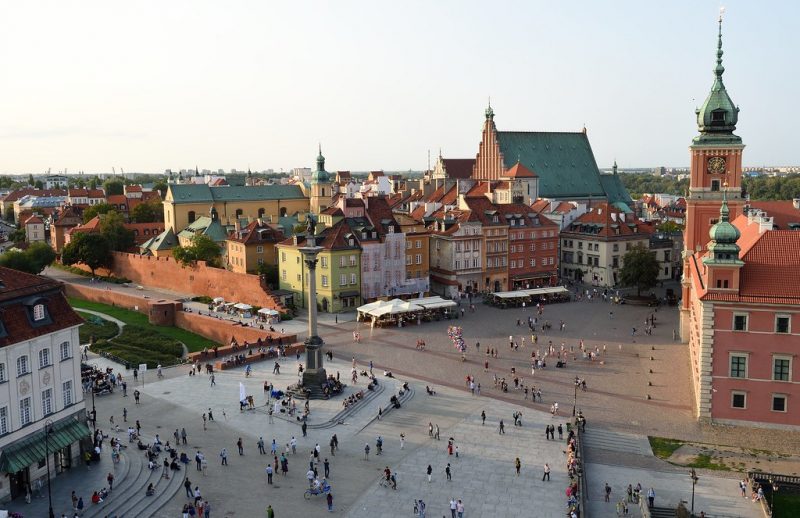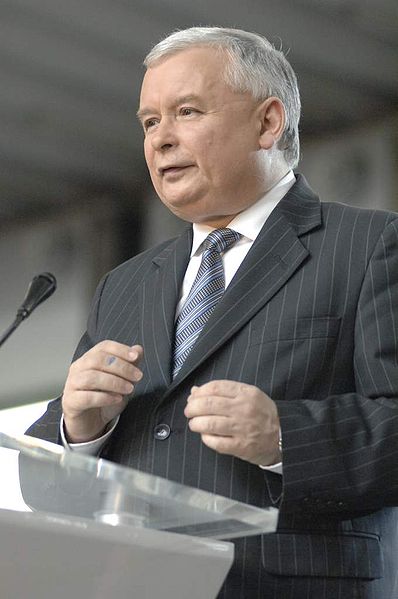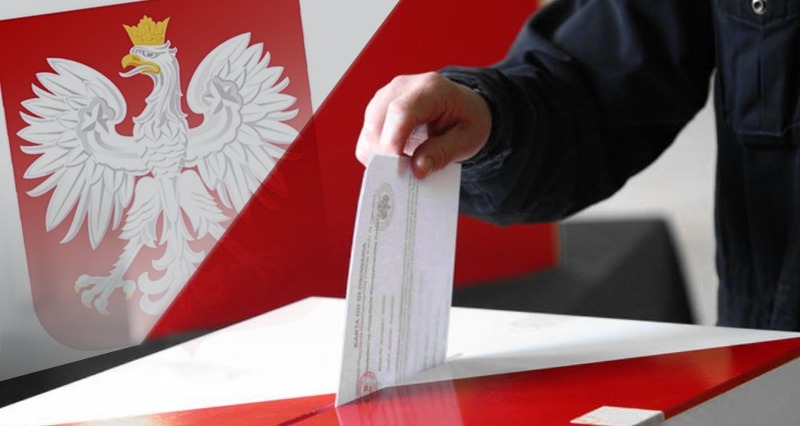The ruling pro-American Law and Justice party won the general election in Poland and got an independent majority in the Sejm (the lower house of the Polish Parliament). Despite the record mobilization of the electorate, PiS was only able to repeat the result it reached 4 years ago. In addition, it lost the majority in the Senate (the upper house). Meanwhile, presidential elections will be held in Poland next year in which the current president, PiS politician Andrzej Duda, is far from a favorite.
Longing for a “Democratic Dictator“
Poles love to be proud of their democratic tradition and parliamentary institutions which determined the specifics of their historic state (The Polish-Lithuanian Commonwealth) in the 17th and 18th Centuries. Somewhat less willingly, however, they mention that the alleged democracy was, in fact, a cover for the rule of oligarchy and anarchy constantly being caused by the Polish nobles dominating the country. At the same time, there has been a sense of nostalgia for strong-handed rule that restricted “excessive freedom“, which historically is most personified by the highly popular cult of the pre-War dictator – Marshal Józef Piłsudski. All this makes Polish consciousness a specific mix in which a lot is said about democracy, but after that men look for someone to give orders. That is probably why Poles tend to sway towards an unjustified superiority complex e.g. towards Russians, allegedly “too accustomed to listen to the authorities“, but at the same time they quite clearly envy the Russians with such a leader as Vladimir Putin (and similar with Belarusians and Alexander Lukashenko)…
In present day Poland, these historical and conscious circumstances have led to a situation when the elections were democratically won again by the party often accused (in Poland and abroad) for violating democratic standards and constitution. So, do Poles want to have their own “democratic dictator” again?

Flickr
In Defence of Hope
That theory is a wee bit more complex. The overall turnout for the election was over 61%, the highest since the fall of communism in 1989. The initial research on the motivation of the electorate is clear: the Poles went to the polls in such large numbers to, above all, defend the social policy of the PiS government and to express their hopes for a better future.
Optimism has largely meant continuation, because the entire liberal-democratic and liberal-national opposition platformed that everything will become worse, while Poles prefer to believe that the worst has already passed.
One element of PiS policy is of key importance here – the first serious social benefit program since 1989. Introduced during the party’s previous term, the 500+ program was initially launched to provide about $130 a month to families with several children, though now it is being used more widely. This program aroused huge discussions in Poland, governed for the last 30 years by the liberal paradigm, the direction of the International Monetary Fund and the George Soros Foundation. For three decades, Poles have heard that they are doomed to themselves, that the state has no money and is also unable and unwilling to help families, the unemployed, pensioners or youth – because everyone is in charge of his own destiny and only American style success counts. And, naturally, the poor remain poor – because apparently they are not trying hard enough, or that they are the orphans of Communism, or, quite simply, that they are lazy and parasites of society. So by providing $130 a month, the masses of Poles were convinced that they were not completely deprived and devoid of value.
For the last 4 years the liberal opposition has tried to attack 500+ from the same worn out and well known positions – as a “bonus for sluggishness” or even an “election bribe”. Ultimately, however, all the opposition forces: the liberal Civic Platform (PO), the centrist Polish People’s Party (PSL) and the Democratic Left Alliance (SLD) were forced by circumstances to change their tone, limiting their messaging to scaring Poles that the economic situation will end soon and the money for the social programs would simply disappear. The voters, however, saw it quite differently. Despite the opposition assuring otherwise, the average voter was sure that when the “others” came into power, they would simply take 500+ away. And the majority of the Polish population – as we can see by the results – just did not want that. The highest turnout since 1989 clearly indicates that when Poles care about something (in this case even a substitute for social security) – they are able to mobilize.
Defeat of Liberalism
Of course social programs were not the only front in the election campaigns. Both PiS and PO tried to interest Poles in the ideological dispute centered around LGBT slogans. However, while PiS was able to harness the objections of the conservative element of Polish society against excessive moral freedom known as the “promotion of perverts”, PO, as the opposition, decided to embrace trendy Western political correctness and the concept of “gender selection” and lost many of its more traditional voters who turned to PSL (originally an agrarian party, now positioning itself as a kind of Polish Christian Democrats). Secondly, the dispute itself ended up promoting a specific kind of Left party, after years of being out of parliament, to return not under red but under rainbow banners. Here we come to the next paradox of the Polish political system. Here, functionally, the role of the classical left is occupied in present Polish realities by… the largest right-wing party, Law and Justice, whose leader, Jarosław Kaczyński repeated on election night his promise of “building a welfare state in Poland“. All the rest of the parties – PO, PSL, and even the Left, as well as a new force, the national-liberal Confederation – refer to either economic or moral liberalism or to both sides of this ideology.
Glass Ceiling of PiS
Does this mean that by having 235 deputies (out of 460) and 49 senators (out of 100) PiS can be certain of the durability of its power? Analysts are sceptical, pointing out that the current result seems to be the peak of Jaroslaw Kaczynski’s party, so either inertia awaits it or even the process of gradual decline of influence has already begun.

Wikipedia
First of all, it should be noted that the current result (43.59%) – was obtained by PiS thanks to a record result of mobilization of Poles (described above). The people expected to vote and for which parties already did, shortly speaking. There is no question of any new flow of electorate. In the Polish parliamentary system, this gives relatively stable governments, but only if PiS also win next year’s presidential election. In 2015, the personally unpopular leader of PiS, Jarosław Kaczyński purposely did not stand, instead putting forward a completely unknown second-line politician, Andrzej Duda. He unexpectedly won, but has later failed to build a personal political position, and to this day he remains the object of jokes as a “just a man to sign laws“.
Next year, such an empty candidate will have to face the same common opposition front which has just won the Senate election. The liberal opposition would like its presidential candidate to be Donald Tusk, who is just leaving the office of the President of the European Council, but even if he does not decide to run, PiS cannot sleep quietly just waiting for spring 2020.
The situation of the ruling bloc is further aggravated by the fact that it is not actually as united as the opposition likes to portray it. On the contrary, Law and Justice is in fact a United Right, a kind of in-depth coalition of three parties: PiS itself (200 MPs and 44 senators), the social-conservative Solidarity Poland (SP) with 18 MPs and 2 senators and the centrist Agreement (PJG) with 18 MPs and 2 senators. These smaller organisations have strengthened their influence within the joint parliamentary group, which in turn increases the ambitions of their leaders: Minister of Justice Zbigniew Ziobro (SP) and Deputy Prime Minister Jarosław Gowin (PJG). As it is commonly known, they are not at all enthusiastic supporters of the Prime Minister chosen by J. Kaczyński, the technocrat Mateusz Morawiecki, who also has quiet but consistent critics within PiS itself. J. Kaczyński, who is formally outside the government, holds all of this with an iron fist – – however, his health is clearly worsening. It has already been announced that immediately after the election, the PiS leader is going to a hospital for at least several months (which was long postponed). Rumors have been quite widespread in the Polish capital that say the Polish “democratic dictator” is much more seriously ill than it is officially told. This is key information for the internal situation in Poland: Jarosław Kaczyński may not be particularly liked or trustworthy, but he is a guarantee of relative political stability. If he is no longer politically present, then the fight for leadership in the power vacuum will emerge (among others, between Prime Minister M. Morawiecki, minister Z. Ziobro, president A. Duda, deputy prime minister J. Gowin etc.) and will blow up PiS, and with this party the entire political system in Poland.
Despite all of its democratic legends, Poland is in a similar situation to several Central Asian republics, in which everyone wonders what will happen after the death of the dictator / father of the nation…
Trap for the “Conservative Social-Democracy“
What’s more, becoming the Polish signature for “conservative social democracy“, Law and Justice sets another trap for itself, connected with awakening the hope and social needs of Poles. This can be clearly seen with the example of the multitudes of Poles who listened to the calls of the government and returned to Poland after economically migrating to the West (where there are still around 3 million Polish employees, i.e. nearly 10% of the population).
The ones returning to Poland, e.g. from the UK, do not hide that one of the most convincing arguments for them to end their emigration is the above-mentioned 500+ social program. Although they believe in lasting improvements for the Polish labour market, they also want to have a guarantee of security for their families (often with many children). Finally, they return from the systems of Western social states, where family support programs have been the norm for several decades. It can even be assumed that without the British Child Tax and Child Benefit or German Kindergeld, Polish emigrants might have never decided to establish such large families. Well, now they hear and can see that living conditions have objectively improved in Poland and that they too can have their own support program!
Those returning face other well-known problems, such as the lack of flats, especially those offered for rent for families. The housing market (dominated by big private developers) operate inefficiently and with a poor eye for the needs of the country. Alongside this, landlords still are extremely risk averse and rarely take on any tenants that might have problems with payments. In addition, the state health service is in a decisive crisis, internally heavily indebted. The average waiting time for a visit to a specialist doctor in Poland reaches up to several months. Focusing on the simple distribution of benefits, Law and Justice, despite promises, has not even touched the problem of healthcare reform. Government housing programs also proved to be a total failure (only less than 300 flats were built under them).
These may be decisive factors for Polish society on their attitude towards further PiS rule. As mentioned before – Poles are ready to defend their hope for a “Welfare State“, but they will also demand that it not only meets their basic needs. Having a flat or house and healthcare security are among the key needs. After the initial satisfaction of a basic social program, people begin to think about what else they want and need. Housing and a shorter queue to the doctor are long standing desires. Another election with the same benefits, which everyone will eventually see as the norm, will not provide a winning strategy.
Who Will PiS Eventually Lose To?
Here, however, the question arises: whether PiS would have anyone to lose the election to, as long as the party maintains its cohesion?The main opposition parties: PO and PSL also probably reached their maximum potential (respectively 27.40% for PO and 8.55% for PSL). So, could a possible change on the Polish political scene be associated with the SLD’s return (12.56%) and the debut of the Confederation (6.81%)? For now, support for these formations is too small to judge their further possible influence. Moreover, the votes for both of them had many features of non-conformism and a kind of protest against the current political class and such voters are rarely consistent and eager to drift to the next new force. Above all – unless some unpredictable event happens (such as the death of J. Kaczyński and immediate disintegration of PiS) – after the presidential election in spring 2020, Poland will have a period of three consecutive years without any elections and therefore so goes the possibility to verify support and popularity, whether for the government or the opposition. No one will be in any hurry to push for early elections either, since it is widely believed that none of the major parties have much of a chance to improve their results.
So, while awaiting the inevitable next great change, Poland is, at the same time, preparing to stagnate. The election excitement passes, a long hibernation awaits us…or a revolution.

















Leave a Reply